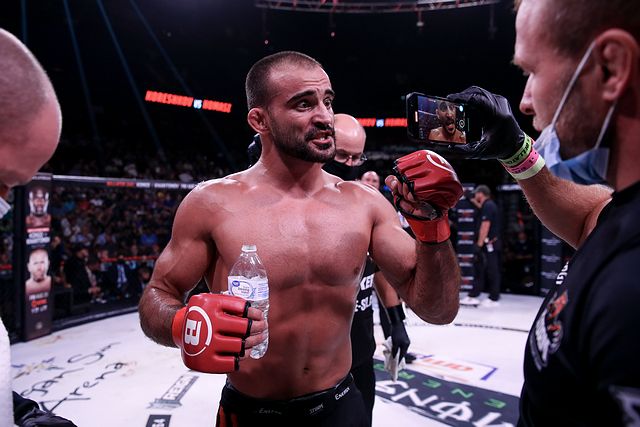
Ben
Duffy/Sherdog.com illustration
Headquartered in scenic Woodloch, Texas, the Mixed Martial Arts Hall of F@#$%&g Awesome (HOFA for short) commemorates the achievements of those fighters who, while they might not be first-ballot selections for a traditional hall of fame, nonetheless did remarkable things in the cage or ring, and deserve to be remembered. The HOFA enshrines pioneers, one-trick ponies and charming oddballs, and celebrates them in all their imperfect glory. While the HOFA selection committee’s criteria are mysterious and ever-evolving, the final test is whether the members can say, unanimously and with enthusiasm, “____________ was f@#$%&g awesome!”
Advertisement
—Kenny Florian
As tag lines go, it’s no “Right leg hospital, left leg cemetery” or “Blood is just red sweat,” but that simple three-word declaration, as delivered by Florian ahead of his fight with Joe Stevenson at UFC 91 in November 2008, was clear, unambiguous and memorable. It was also extremely accurate, as “KenFlo” would go on to choke out Stevenson in the first round, his eighth finish in nine wins to that point in his Ultimate Fighting Championship run, clinching a title shot against then-champ B.J. Penn.
The story of Florian’s route to the Octagon has become the stuff of legend: UFC President Dana White, in Boston to scout talent for his new reality television show, “The Ultimate Fighter,” attended Combat Zone 7 on July 10, 2004, to watch 22-2 Arizona prospect Drew Fickett in a showcase fight against some local kid who was 2-0 at the time. That local kid—Florian—acquitted himself so admirably in a split-decision loss that he ended up getting the call instead of the endlessly talented but endlessly troubled Fickett.
“TUF 1,” of course, featured light heavyweights and middleweights.
On the first episode, lined up alongside massive future light
heavyweight champ Forrest
Griffin, middleweights like Chris Leben
and even some fighters who would eventually drop to welterweight,
such as Mike Swick and
Josh
Koscheck, the lanky 5-foot-10 Florian barely looked as if he
belonged in the same sport, let alone the same weight class. As the
multilingual son of a surgeon, Florian’s brainy, well-spoken
demeanor and cerebral approach to fighting, paired with his former
college soccer player physique, resulted in his being
underestimated by coaches Chuck
Liddell and Randy
Couture. He was drafted 11th out of 16 fighters but would go
on to accomplish more than almost all of them.
On the reality show, Florian proved the eyeball test to be only partially correct. Yes, he was physically overmatched against the bigger bodies in the house, as he was in his middleweight semifinal against Leben, but he could not simply be counted out, as he showed when he split Leben’s face wide open with elbows from the bottom for a win by doctor stoppage. The sight of a blood-soaked Florian—all of it his opponent’s—snatching victory from the jaws of defeat with a finish from an unexpected position was a good preview of the career that was to come.
Florian was overwhelmed in the “TUF 1” middleweight final by the younger, more athletic and far more experienced Diego Sanchez, but received a UFC contract, nonetheless. He quickly established himself as one of the show’s top alumni with three straight wins by finish. That streak coincided with the UFC’s resurrection of its long-dormant lightweight division, and when the promotion decided to fill the vacant title at UFC 64, Florian got the call opposite fellow former welterweight Sean Sherk. He lost via decision, fighting valiantly but unable to stop the takedown game of “The Muscle Shark” or find the kind of fight-changing offense from the bottom that had turned the tide against Leben.
That set the pattern, and the rhythm, for the remainder of Florian’s career. After the “TUF” finale, he lost just four times: three times in title fights and once in a lightweight title eliminator against Gray Maynard. Of the men who defeated Florian, Sherk and Maynard were two of the best lightweights of their era and Penn and Jose Aldo were two of the greatest fighters of any era—and unquestionably the greatest lightweight and greatest featherweight the sport had ever seen at the time he faced them. In between those setbacks against the very best of the best, Florian was one of the most potent offensive fighters and vicious finishers in all of MMA. Ten of his 12 UFC wins came within the distance, and he was at one time the promotion’s all-time leader in rear-naked choke submissions.
Florian retired in late 2011 after his brief featherweight run, citing his history of back injuries, which necessitated surgery and threatened permanent nerve damage. Since then, he has remained involved with combat sports as an announcer, analyst and media personality, including roles with Professional Fighters League, Fox Sports and alongside UFC play-by-play man Jon Anik as one half of the “Anik & Florian Podcast.” The role suits him well as a man who always had a mind for fighting, but it should never overshadow his legacy as one of the most sublimely violent souls to grace the cage.
SIGNATURE MOMENTS: Needless to say, a man with 10 finishes in the UFC has plenty to choose from. One fair sample is Florian’s clash with Joe Lauzon in the main event of UFC Fight Night 13 on April 2, 2008. Nearly eight years younger than Florian, “J-Lau” was in many respects the new model, as a fellow Bostonian with a similarly unimposing frame, identically constructed nickname and shared proclivity for quick-strike violence. In one of the best UFC lightweight fights ever, Florian showed on that night that the original was still unsurpassed. He got the best of the first round, cutting Lauzon open with an elbow—of course—and surviving multiple submission attempts. In the second round, it was Florian’s ground game that took over, and he overwhelmed Lauzon with a torrent of punches and elbows from top position, his seventh finish in as many wins in the UFC.
Florian should justly be remembered for his penchant for rear-naked chokes and his pioneering use of elbows as murder weapons, but one of his most admirable traits as a fighter was his refusal to stagnate. His wrestling and striking, both liabilities early in his career, were strengths by the end. Witness his pair of wins immediately after his unsuccessful second lightweight title shot, over Clay Guida and Takanori Gomi. Against Guida, whose calling card has always been his wrestling, Florian showed sturdy takedown defense and even initiated takedowns of his own, while also inflicting one of the most horrific cuts of his career. Against Gomi, a sprawl-and-brawler with numbing power, Florian showed off his increasingly potent muay thai, getting the better of the striking exchanges before hitting a beautiful takedown in Round 3 to set up his record seventh rear-naked choke.
THE HOFA COMMITTEE SAYS: This enshrinement is long overdue. For the time we got to enjoy his work—and as a late starter and early retiree, it was sadly short—Florian was about as sure a guarantee of violence as any name on the UFC roster, and probably the surest guarantee of blood, bar none. He is one of the greatest success stories to come from “The Ultimate Fighter” and one of the most accomplished fighters never to win a UFC title. Just as important to the HOFA, he was a true original who always stood out from the pack, which is just as rare a quality today as it was nearly two decades ago when he first crossed our television screens.
It is with great pleasure that we say: Kenneth Alan Florian, you are f@#$%&g awesome.
More




 The MMA Hall of F@#$%&g Awesome
The MMA Hall of F@#$%&g Awesome


